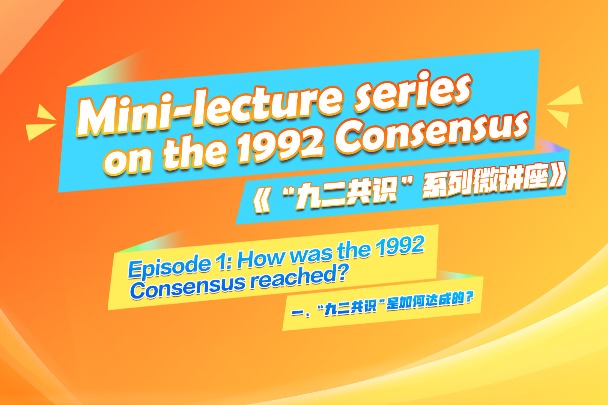Passion for opera bridges Taiwan Strait

Editor's note: Young Chinese people are being increasingly drawn to the nation's traditional culture, including those from Taiwan, despite efforts by the authorities on the island to sever cross-Strait ties through de-Sinicization policies. Three people from Taiwan share their stories.

Cheng Ting-yi always carries with him his notes on Kunqu Opera, whether in Taiwan or later when he pursued studies in Beijing. His notes, carefully taken down in pencil, represent over six years of studying the ancient Chinese musical art form.
Through Kunqu Opera, Cheng, 28, has explored the larger landscape of Chinese culture, traveling from Taiwan to the Chinese mainland to seek out the roots of the craft. He's shared the beauty of Chinese culture by performing abroad, fostering a sense of pride in his Chinese identity.
Despite his sporty outward appearance, many who first encounter Cheng, a doctoral student at Beijing Normal University, are intrigued by his profound fascination with Chinese classical literature and traditional opera.
Kunqu Opera emerged in the mid-Ming Dynasty (1368-1644), created by a group of literati during their gatherings. Both the audience and the performers from the beginning were cultured people.
Cheng's exploration of the art form began during his time at Fu Jen Catholic University in Taiwan, where he joined an opera club and had the opportunity to study with renowned Kunqu actor Wen Yuhang, a figure of repute on both sides of the Taiwan Strait.
Reflecting on his early experiences, Cheng said taking the stage for just five minutes for the famous piece The Peony Pavilion required a month of intensive study.
"It's all very difficult to master in terms of the lyrics and the singing techniques. Kunqu is more elaborate than other kinds of operas," he said.
"It's this very difficulty that makes it precious, as it retains the most original aspects of life from ancient China," he said, adding that if one wishes to connect with ancient figures such as Tang Bohu, the Ming Dynasty scholar and calligrapher, or Tang Xianzu, the Ming Dynasty playwright, Kunqu Opera is the way.
During his undergraduate years, Cheng founded a Kunqu Opera association at Fu Jen Catholic University, with membership peaking at 20 individuals.
He said many of the Kunqu teachers in Taiwan come from Shanghai, and they would often expose students to mainland cuisine, fostering a deeper connection to the diverse facets of Chinese culture.
Cheng's interest in traditional Chinese culture has also prompted him to delve into the realms of ancient poetry and verse. He has participated in cultural exchange trips to the mainland to introduce Taiwan students to the landscapes and themes depicted in classical Chinese poetry.
In 2015, during his second year of undergraduate studies, he visited Beijing, where the ancient charm left a lasting impression. The experience made him decide to undertake a six-month exchange program at Beijing Normal University the following year.
After graduating in Taiwan, Cheng studied for his master's at Beijing Normal University, where he joined the university's Kunqu Opera society, meeting with fellow young enthusiasts from the mainland.
"I was once invited to the Northern Kunqu Opera Theatre to watch a play in Beijing. When the show was over, I went backstage with the host to meet the actors. It turned out some of the actors were former students," he said.
"I was almost moved to tears at that time. I truly felt the power of apprenticeship. In this way, culture and art have been passed down from generation to generation."
In 2019, Cheng was chosen to represent Beijing Normal University and perform Kunqu Opera in the United States for a Chinese cultural event at Oklahoma State University.
He fondly recalled meeting Professor Paul Bell, who was the chairman of the Confucius Institute at the university, and even shared with him a glass of Kinmen Kaoliang liquor, a specialty from Taiwan.
His performance on the campus lawn garnered praise from the audience, and afterward Cheng donated his performance attire to the university's library.
"Young and old, the foreigners liked the performance very much," he said, adding that the experience strengthened his belief that traditional Chinese culture serves his identity.
As the secretary-general of the Chinese Youth Development Association's Taiwan student branch, Cheng has many opportunities to connect with young people from Taiwan studying on the mainland. He found there is a growing convergence and resonance between young people on both sides of the Taiwan Strait in popular culture.
"There is a craze for 'China chic' among younger people such as those in Taiwan who prefer products or entertainment with Chinese cultural elements, including reading Chinese classics and wearing traditional attire," he said.
"The motivating force behind the trend must be that China is rising on the world stage. We have confidence in our nation. That's why we want to explore the nation's past to learn about the splendid history and glorious culture," he added.
Wang Jing, Peng Chengcheng and Liu Shenshi contributed to this story.
- Top News
- Events honor role of first provincial governor in modernizing Taiwan
- 'Soul Ferryman' of Taiwan Strait: Liu De-wen's 22-year mission to bring veterans home
- Taiwan-born kendo instructor grows cross-Strait ties
- Chinese mainland says cross-Strait consultation possible with recognition of '1992 Consensus'




